Cheap Travel in France: Tips from an Insider
By Finn Skovgaard

|
|
A train passes through the lovely Loire, usually a cheap form of transportation in France. Photo © Transitions Abroad.
|
Affordable travel does not mean going to all the cheapest places and accepting the lowest quality. Such a mode of travel is as much about finding where you can get a decent quality for a reasonable price, keeping in mind that paying twice as much is no guarantee for twice the quality.
Affordable Wining and Dining in France

|
|
An oyster platter at a restaurant in Nice, France can be surprisingly inexpensive.
|
Steer clear of the "tourist trap" areas and shops, typically in places like the Champs Elysees, near the Louvre, and the Left Bank near the River Seine. Often, the food is no better — if not worse — than in far less expensive areas. In Paris, many restaurants offer modest prices and decent quality on the side streets where ordinary Frenchmen work or study. A few unscrupulous restaurants serve substandard food to tourists since such visitors are not likely to return anyway. There is no easy way to identify the black sheep unless you trust your guidebook or app, or have a good instincts based on evaluating a menu and the amount of locals dining in the establishment. Locals might be willing and able to help you if you ask. It's a thing of the past that you eat well everywhere in France. Today, you can eat well if you know where to go.
You can get standard meals throughout France at chain restaurants and steakhouses. While affordable, they don't have much in common with traditional French cuisine.
Restaurants will serve free tap water with a meal — "un carafe d'eau s'il vous plait!" — if you'd rather not pay for bottled water, sometimes near the price of gold. Tap water is commonly served at ordinary restaurants. Nonetheless, suppose you order tap water at an excellent restaurant. In that case, the servers may regard you as a cheapskate and treat you accordingly, though if you are friendly and show respect, they will quite understand. A café can technically charge for a glass of water if they display the price, and so can a restaurant if you're not eating there.
In bars and cafés, servings are cheaper if consumed at the counter rather than at a table, which a waiter serves. Don't make the faux pas of ordering at the counter and then sitting at a table. You'll be charged extra the moment you touch the chair. If you want to dine at the table, it is considered traditional in France to order at the table as service is included in the price of your meal.
Gas stations on freeways, some open 24 hours a day, are convenient and have a standardized choice of food and drink, far better than what you would find in the U.S., but relatively expensive. Many little food stores in cities, known as alimentations are also more costly than markets and supermarkets.
Certain restaurants are closed over winter in typical summer tourist regions like Provence. You may have planned for a cozy little restaurant recommended online — only to find it closed — and end up at an expensive place or fast-food joint (just say no, though often the fast-food is better in France due to the fresher ingredients and more demanding French) instead because no other place is open.
Order wine from the region whenever possible. Most hosts like to present their local produce, so they often select what they think is the best choice of wine. Prices are most reasonable by the caraffe, even in restaurants. Describe the taste you prefer in wine, and don't pretend to be a wine expert if you aren't. They'll find out very quickly anyway, especially as the French don't generally characterize wine by the grape name. Try to avoid sticking to known big names such as the pricey Chateauneuf-du-Pape. Use the opportunity to discover little-known winemakers who produce some excellent and different wines in almost all regions of the country.
If you are cooking for yourself, check out the discount supermarkets. Supermarkets often indicate the cheapest products by placing them near the floor: Premier prix or marque de repère. The packaging of these products usually deliberately appears more cheap and unattractive. Shop at markets for fresh produce, although they are not necessarily cheaper. Select seasonal fruits and vegetables if you can. If you don't know what is in season, then it is likely what you see in the largest quantities. In the countryside, you may find producers selling directly to consumers. Street vendors of fruit and vegetables in Paris can be cheap. Other street vendors may be expensive. There are no rules without exceptions in France, like the French language itself.
Money Matters
in France
Avoid exchanging cash if you can. You lose a significant percentage. Use your credit card for purchases, but check your bank or credit card's commission since that could add up to 3-5%. Mastercard and Visa are accepted almost everywhere. American Express is much less so due to their higher fees for merchants. Using ATMs is usually cheaper than exchanging cash. Still, you should check your bank's fees and commissions before you arrive in France. ATMs at banks often charge twice for cash withdrawals: A currency commission and a cash withdrawal commission. Both could have a flat minimum amount.
Certain shops don’t accept credit cards for amounts smaller than 10-20 euros, so try to avoid running out of cash.
Negotiate prices. It rarely harms, and the worst that can happen is that they refuse.
Tips are usually included in any services provided. A service fee of 15% is by law included in restaurant prices as shown on the menu. Adding a few euros in coins after the meal is a polite sign of respect.
Accommodations

|
|
You can find an affordable home rental during the off-season when the weather is often very pleasant (here in early October and perfect). Photo ©Transitions Abroad.
|
There are many charming B&Bs with friendly owners. However, such warm hospitality often comes at a cost. Since you likely will spend much of the time at a hotel sleeping, you should go for standard fare if your budget is limited. Chain hotels offer a clean standard product that is similar throughout the country. However, the cheaper ones are often found near out-of-town shopping malls or industrial zones. You will also frequently need a car to reach them. In all hotels, breakfast is charged in addition to the room and is optional. Not all budget hotels have bathrooms in the hotel rooms. The British English term "en suite" means "attached to the bedroom." In Europe, "bathroom" is generally not used in the sense of "toilet," but in the sense of where you wash, and your room may not even have a toilet.
Of course, with Airbnb, Homestay, and other such agencies becoming so common, you can reserve in advance and often find satisfactory accommodations since owners must be aware of online reviewers to thrive. There are also long-term vacation rentals in France through other agencies. The kitchen and size of the accommodations can make the experience very affordable, quickly booked online, and allow you flexibility with relaxation. You don't have to go out to eat every meal since you can buy local groceries and fix a quick breakfast, lunch, or dinner with the typically better or great local ingredients.
Recreation in France

|
|
A view of Château de Chenonceau, a castle in the fabled Loire valley. You may visit this region on the cheap during the off-season months.
Photo ©Transitions Abroad.
|
Because museums are cultural, the French love to offer free entry in various ways. There are days with free entry, and many types of visitors can get in for free or at a discount — students, young people, seniors, the unemployed, pregnant women, people with disabilities, families with many children, etc. Bring any official cards you may have that document your particular situation, and study the official websites to figure out when you can get the cheapest at each place, as there is no standardization regarding free entry. Also, beware that museums are closed one day a week.
Some sights may be more attractive outside of the high vacation season. For example, the Fontaine de Vaucluse, a spring coming out of a mountain in Provence, is dry during summer and most worth visiting when the snow melts in the early spring.
Finally, they don't close for lunch if you see sans interruption written at any restaurant.
General Advice
Avoid the high season from mid-June to the end of August. It is crowded all over southern France; along the coast, it is one long traffic jam, and prices are over-the-top. The weather is pleasant and warm in June and September, too, in southern France. March is the earliest for out-of-season travel to the south, and late October is the latest, as that is the rainy season. Paris, however, is nearly empty in August because all the Parisians are in southern France. Therefore, street parking is free in many places in Paris in August.
Note that post-pandemic, many Europeans now travel more off-season than ever, so you will still encounter a few more people in guidebook hotspots.
I hope that you use this article as inspiration to find the best deals. Keeping your ears and eyes open when seeking deals in France is the best single advice I can offer to help ensure an enjoyable trip.
Finn Skovgaard, born in Denmark in 1960, emigrated in 1993 and settled in France in 1998. After over 20 years in an I.T. career, he created a business for relocation, translation, freelance writing, and minibus transport in France. He has lived in England, Luxembourg, and Germany.
First serial rights in the USA, including publishing on TransitionsAbroad.com. © Copyright Finn Skovgaard. All rights reserved.
|
